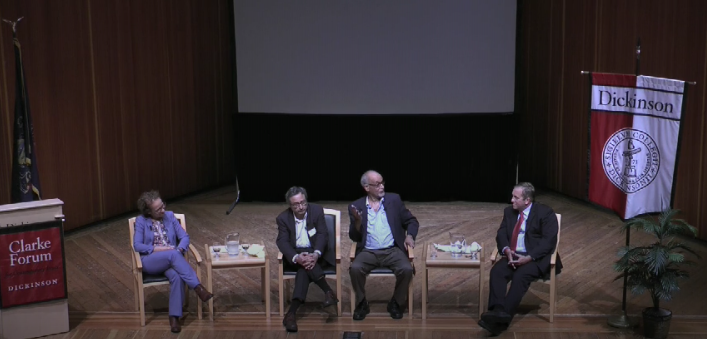Slavery and Immigration Intersect at Clarke Forum
At the annual Constitution Day address, a panel of historians and Civil War experts commented on the Fugitive Slave Act of 1850 and its parallels to modern day federalism.
About 300 students, faculty and community members attended the panel, titled “Fugitive Slave Law and Crisis over Immigration Policy: Assessing a Forgotten Legacy,” on Monday, Sept. 17 in the Anita Tuvin Schlecter Auditorium.
The three panelists were Vanderbilt University’s Richard Blackett, Villanova University’s Judith Giesberg and Columbia University’s Andrew Delbanco. The panel was moderated by Matthew Pinsker, Dickinson’s professor of history and director of the House Divided Project, a Civil War research engine that aims to “help make this turbulent and complicated story more accessible within the nation’s classrooms,” according to its blog.
Clarke Forum Student Project Manager John Adeniran ’19 introduced the panel. The “lessons learned from the Fugitive Slave Law are precedent for current day immigration,” he said. Adeniran wrote in an explanatory statement “it could be argued that our contemporary iteration of ‘sanctuary cities,’” which have recently been targeted by President Trump due to their failure to comply with federal immigration policy “is one that mirrors those in the years surrounding the passing of the Fugitive Slave Act of 1850.”
The Fugitive Slave Act of 1850 mandated that all states, including free states, assist in returning fugitive slaves to their owners, wrote Adeniran.
The panelists grappled with the co-existence of the values of freedom and institution of slavery in the early years of the United States. Blackett argues there is an inherent contradiction in the statement of the Declaration of Independence, which reads “all men are created equal,” with the creation of a “system based on slavery.”
Delbanco countered that many of the founding fathers may have permitted the existence of slavery, expecting that it “wouldn’t last very long.” Blackett added that Americans are proud to live in a “society of law” yet should be challenged to consider that the law can be “terrible” and “morally indefensible.”
Pinsker asked the panelists to consider that some may “abuse history by applying it to the present day” and asked how they would avoid making this same mistake. Giesberg, who wrote an Op-Ed for the Washington Post titled, Jeff Sessions is wrong. Sanctuary-city advocates aren’t like secessionists. They’re like abolitionists, said that Session’s “misuse of history” inspired her argument. Delbanco explained that “the past is complicated… just like the present” and that “it helps to inculcate a certain feeling of humility.”
The panelists drew several comparisons between the Fugitive Slave Law and modern social justice movements. Delbanco said that the law “helped create the first black lives matter movement” by “inspiring individuals to take law into their own hands when abusive to citizens.” Blackett asked challengers to consider the children of returned fugitive slaves and to draw parallels to present-day family separation policies. Giesberg explained that when she examined historical notices for missing family members, she noticed that many had been posted for children.
Delbanco noted that the Fugitive Slave Act “had exactly the exact impact of what it was meant to do,” and aided the abolitionist movement by “making the problem real” for those who had been able to turn a blind eye to slavery.
Each panelist offered a final comment on the application to the nights’ lesson on the current political system. Delbanco said the final takeaway lesson was that one is at fault if “you are not complicit in crimes against humanity in a society in which you belong,” and stated that “we all bear responsibility for US immigration policy.” Giesler said that even when America has had bad laws, “Americans tend to be better than our laws and our leaders” and that she “hope our leaders are as good as the people.” Blackett stressed the importance of voting, explaining “for a democracy, America has a terrible turnout.”
Jim Hoefler, professor of political science and director of the policy studies program said “the power of the state to resist policies of the federal government is part of our federalism.”
Brodie Philips ’19 said that he “liked the panel a lot” but thought it could have been better if it was “more focused on the present,” explaining that the points the panelists presented about the present were “extremely important.”
Mike Caesar ’19 added that although the event was “a very fitting discussion for Constitution Day,” he had trouble drawing parallels from the panelists’ discussion of the Fugitive Slave Act, explaining that the panelists didn’t directly “touch on sanctuary cities.”
Adenian said he thought the panel was “phenomenal…each of the scholars were able to find strong intersections between the Fugitive Slave Act of 1850 and contemporary immigration issues of the U.S.”
The program was sponsored by the House Divided Project and the Departments of History and American Studies and the Program in Policy Studies co-sponsored it.






